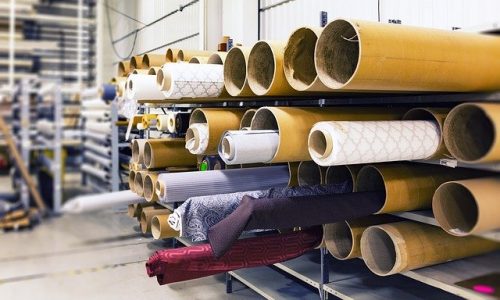Report alleges Boohoo supplier factories could be behind surge in Covid-19 cases

Leicester textiles factories supplying Manchester online fashion retailer Boohoo could be behind the surge in cases in the city which led to it becoming the first in the UK to be subject to a localised lockdown by the government, according to a new report.
The report from Labour Behind the Label, entitled Boohoo and Covid-19, alleges that conditions in Leicester factories, which it says primarily supply Boohoo have been putting workers at risk of Covid-19 infections and fatalities.
The report suggests that some textile factories in Leicester have been operating as normal throughout the lockdown because of sustained orders from their biggest customer, Boohoo. Labour Behind the Label says that by April 22nd, factories were reportedly running at 100% capacity.
The report says it is “inconceivable” that these factories would be able to operate at full capacity while ensuring social distancing and adequate social Covid-19 protection measures.
Labour Behind the Label even says it has heard of workers who tested positive for Covid-19 forced to work throughout their illness to fulfil orders.
The report says that Boohoo Group Ltd accounts for almost 75–80% production in Leicester and sources around 60–70% of its production from Leicester. It adds that this has increased in recent weeks to around 80%.
Labour Behind the Label also highlights several cases of alleged furlough fraud, with the majority of these claims reportedly linked to Boohoo and its sister brand Pretty Little Thing.
The report says: “In one case, workers in one factory were allegedly told by managers in early April, that they should hide the previous month’s payslips so that the management could make an inflated claim for furlough money. In another instance, a worker received furlough pay but was not provided with any payslips or details of how the furlough pay was calculated. He was told that in order to get a payslip he would have to go into work – which he refused as he chose to remain self-isolated.
“One female worker was allegedly pressured by her managers to return to work at the end of May, despite disclosing that she has a very vulnerable family member. So far, she had not received any furlough wages during the lockdown and was informed that she needs to restart work.
“Other workers have reported they were made redundant when lockdown was announced and said they were not on ‘the books’ therefore did not qualify for furlough payments. They found other jobs and were informed by their new employers that their previous employer had enquired how these ex-workers were being paid. The new employer replied that they were paid by bank transfer, and was told not to do so because the ex-employer had in fact declared the workers as being on the books since February and was currently claiming Furlough payments on their behalf.
“We have also been informed that several employers have joked that they are now getting rich through the furlough scheme as the money is not paid to the workers. Another rumour is that factories are being advised to only claim furlough for the period in lockdown so that they avoid any future inspections regarding furlough payments which would uncover other illegal practices, such as payment of illegally low wages, etc.”
In a statement, Boohoo said: “[We] have fundamentally changed the way that we operate since coronavirus and every decision we have made has had the safety and wellbeing of our people at heart.”
The company added: “None of our suppliers have been affected at this time and we are pleased that our in-house compliance team have been able to resume their work. Our third-party auditors are also out visiting sites this week.”
One textile factory owner in Leicester, who wished to remain anonymous, told The Guardian: ” “These are untrue claims by people who are never here to tell the good news about Leicester. Everybody here has been very careful.”
On Monday, Health Secretary Matt Hancock announced that Leicester would have to continue to follow follow stricter lockdown restrictions for at least two weeks, and non-essential shops would be asked to close.








